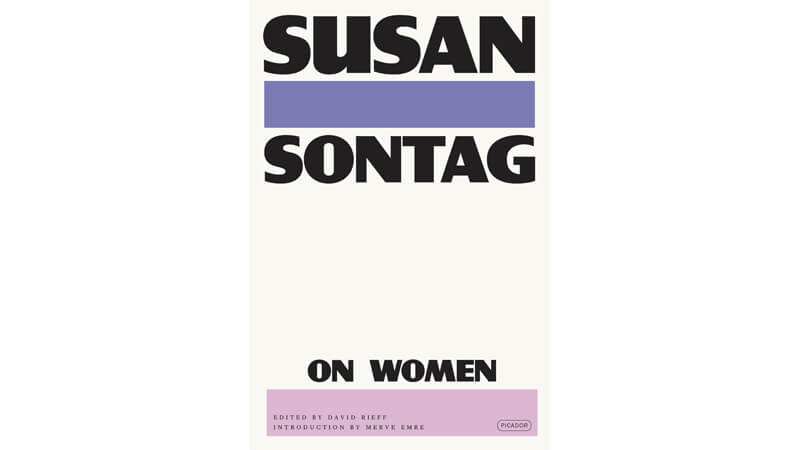Exclusive Excerpt From Susan Sontag’s New Essay Collection, On Women
Susan Sontag (1933-2004) was a groundbreaking American writer, philosopher, activist and critic. Her influential works spoke powerful truths about the political and social standing of women in the 1970s. This is a Service95 exclusive excerpt from her essay The Double Standard Of Ageing, which appears in On Women, a new collection of her feminist writing

I remember my closest friend in college sobbing on the day she turned twenty-one. “The best part of my life is over. I’m not young anymore.” She was a senior, nearing graduation. I was a precocious freshman, just sixteen. Mystified, I tried lamely to comfort her, saying that I didn’t think twenty-one was so old. Actually, I didn’t understand at all what could be demoralizing about turning twenty-one. To me, it meant only something good: being in charge of oneself, being free. At sixteen, I was too young to have noticed, and become confused by, the peculiarly loose, ambivalent way in which this society demands that one stop thinking of oneself as a girl and start thinking of oneself as a woman. (In America that demand can now be put off to the age of thirty, even beyond.) But even if I thought her distress was absurd, I must have been aware that it would not simply be absurd but quite unthinkable in a boy turning twenty-one. Only women worry about age with that degree of inanity and pathos. And, of course, as with all crises that are inauthentic and therefore repeat themselves compulsively (because the danger is largely fictive, a poison in the imagination), this friend of mine went on having the same crisis over and over, each time as if for the first time.
I also came to her thirtieth birthday party. A veteran of many love affairs, she had spent most of her twenties living abroad and had just returned to the United States. She had been good-looking when I first knew her; now she was beautiful. I teased her about the tears she had shed over being twenty-one. She laughed and claimed not to remember. But thirty, she said ruefully, that really is the end. Soon after, she married. My friend is now forty-four. While no longer what people call beautiful, she is striking-looking, charming, and vital. She teaches elementary school; her husband, who is twenty years older than she, is a part-time merchant seaman. They have one child, now nine years old. Sometimes, when her husband is away, she takes a lover. She told me recently that forty was the most upsetting birthday of all (I wasn’t at that one), and although she has only a few years left, she means to enjoy them while they last. She has become one of those women who seize every excuse offered in any conversation for mentioning how old they really are, in a spirit of bravado compounded with self-pity that is not too different from the mood of women who regularly lie about their age. But she is actually fretting much less about aging than she was two decades ago. Having a child, and having one rather late, past the age of thirty, has certainly helped to reconcile her to her age. At fifty, I suspect, she will be ever more valiantly postponing the age of resignation.
My friend is one of the more fortunate, sturdier casualties of the aging crisis. Most women are not as spirited, nor as innocently comic in their suffering. But almost all women endure some version of this suffering: A recurrent seizure of the imagination that usually begins quite young, in which they project themselves into a calculation of loss. The rules of this society are cruel to women. Brought up to be never fully adult, women are deemed obsolete earlier than men. In fact most women don’t become relatively free and expressive sexually until their thirties. (Women mature sexually this late, certainly much later than men, not for innate biological reasons but because this culture retards women. Denied most outlets for sexual energy permitted to men, it takes many women that long to wear out some of their inhibitions.) The time at which they start being disqualified as sexually attractive persons is just when they have grown up sexually. The double standard about aging cheats women of those years, between thirty-five and fifty, likely to be the best of their sexual life.
That women expect to be flattered often by men, and the extent to which their self-confidence depends on this flattery, reflects how deeply women are psychologically weakened by this double standard. Added on to the pressure felt by everybody in this society to look young as long as possible are the values of “femininity,” which specifically identify sexual attractiveness in women with youth. The desire to be the “right age” has a special urgency for a woman it never has for a man. A much greater part of her self-esteem and pleasure in life is threatened when she ceases to be young. Most men experience getting older with regret, apprehension. But most women experience it even more painfully: with shame. Aging is a man’s destiny, something that must happen because he is a human being. For a woman, aging is not only her destiny. Because she is that more narrowly defined kind of human being, a woman, it is also her vulnerability.
On Women by Susan Sontag; edited by David Rieff. Published by Picador, May 30, 2023. Copyright © 2023 by The Estate of Susan Sontag. All rights reserved




